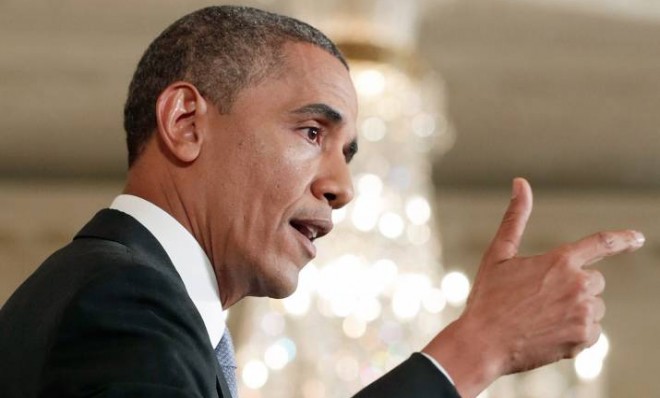Has Obama already doomed the Syria mission to failure?
A limited strike may wind up being more a symbolic gesture than a practical, lasting solution


A free daily email with the biggest news stories of the day – and the best features from TheWeek.com
You are now subscribed
Your newsletter sign-up was successful
The Obama administration is prepared to launch a limited offensive against Syria, and could reportedly begin firing cruise missiles at select targets in a matter of days.
The administration's rationale is clear: Syrian President Bashar al-Assad allegedly used chemical weapons on civilians, a war crime that crosses the "red line" President Obama laid down last year. Yet the practical effects of the strike, and the way the administration has clearly telegraphed it, are raising questions about whether the rumored offensive would accomplish much of anything in the long run.
The administration said Tuesday that Obama is not seeking a regime change. Rather, the proposed attacks would likely level some key military targets, but stop short of a full ground invasion, thus leaving Assad in power.
The Week
Escape your echo chamber. Get the facts behind the news, plus analysis from multiple perspectives.

Sign up for The Week's Free Newsletters
From our morning news briefing to a weekly Good News Newsletter, get the best of The Week delivered directly to your inbox.
From our morning news briefing to a weekly Good News Newsletter, get the best of The Week delivered directly to your inbox.
Since Assad has already shown a willingness to defy international warnings and kill civilians, some have suggested that a fuller intervention is necessary to remove him from power to ensure that he can't perpetrate future atrocities. A limited strike, on the other hand, could convince Assad that the U.S. had "spent itself on Operation Red Line and that no further attacks will be forthcoming," wrote Bloomberg's Jeffrey Goldberg.
Is [a limited strike] meant to signal to Syria's barbaric president, Bashar al-Assad, that he should please resist the urge, tempting though it is, to kill his country's children with chemical weapons and instead limit himself to killing children with bullets and bombs, which he has used effectively and without much in the way of outside interference for more than two years? [Bloomberg]
That kind of logic presents a "false dichotomy — it's either a military strike, or we let them get away with it," wrote The Nation's Phyllis Bennis. A more measured, effective response would be to rally the international community to, say, try Assad for war crimes, she wrote.
Still, others have said the president is right to think he can effectively punish Syria through a limited strike without risking escalating the conflict. And essentially announcing the timing and scope of that attack through the press, as the administration has done, would make the whole conflict "less of a war and more of a ritual" wrote the Washington Post's Max Fisher.
This is what the Clinton administration did in 1998 with Operation Desert Fox, when it and the United Kingdom bombed Iraq as punishment for cheating on weapons of mass destruction disarmament. The strikes were also intended to degrade Iraq's WMD production capacity. The 100 or so targets were, as now with Syria, telegraphed ahead of time. Many of them were empty. Iraq knew it was coming and was mostly unsurprised, which meant that it didn't escalate. The campaign was limited in scope and, although the history of Iraq and WMDs is obviously a thorny one, appeared to be largely successful at least at punishing Saddam Hussein.[Washington Post]
Should a limited strike truly cow Assad without ousting him, it would accomplish the administration's stated goals. Of course, it's hardly clear that such an attack would have the intended effect.
A free daily email with the biggest news stories of the day – and the best features from TheWeek.com
"You can impact targets that have political value and military value," Anthony Cordesman of the Center for Strategic and International Studies, told the Associated Press. "But it doesn't shape the outcome or provide security for the people, and it certainly doesn't deter Assad from going on. At the end of it, it's a little more like winning a schoolyard fight than accomplishing anything of strategic meaning."
Chris Harmer, a former Navy planner who wrote an influential blueprint for just such a tactical strike, has also cautioned against the wisdom of actually implementing that plan. Though he said the attack was practically feasible, he told Foreign Policy that it would be dangerous to carry it out without an overriding objective other than simply retaliation.
"Tactical actions in the absence of strategic objectives is usually pointless and often counterproductive," he said. "I never intended my analysis of a cruise missile strike option to be advocacy, even though some people took it as that."
Even Gen. Martin Dempsey, chairman of the Joint Chiefs of Staff, has expressed concern with how a military intervention could unfold. In a letter to Sen. Carl Levin (D-Mich.), chairman of the Senate Armed Services Committee, Dempsey cautioned that a strike "could inadvertently empower extremists or unleash the very chemical weapons we seek to control."
If Obama is merely concerned with retaliating against Syria, a limited strike would technically accomplish that goal. But beyond that, it's unclear whether an attack would truly deter Assad in the future, nor is it clear whether the aftermath of such an attack would play out favorably for the U.S.
Jon Terbush is an associate editor at TheWeek.com covering politics, sports, and other things he finds interesting. He has previously written for Talking Points Memo, Raw Story, and Business Insider.
